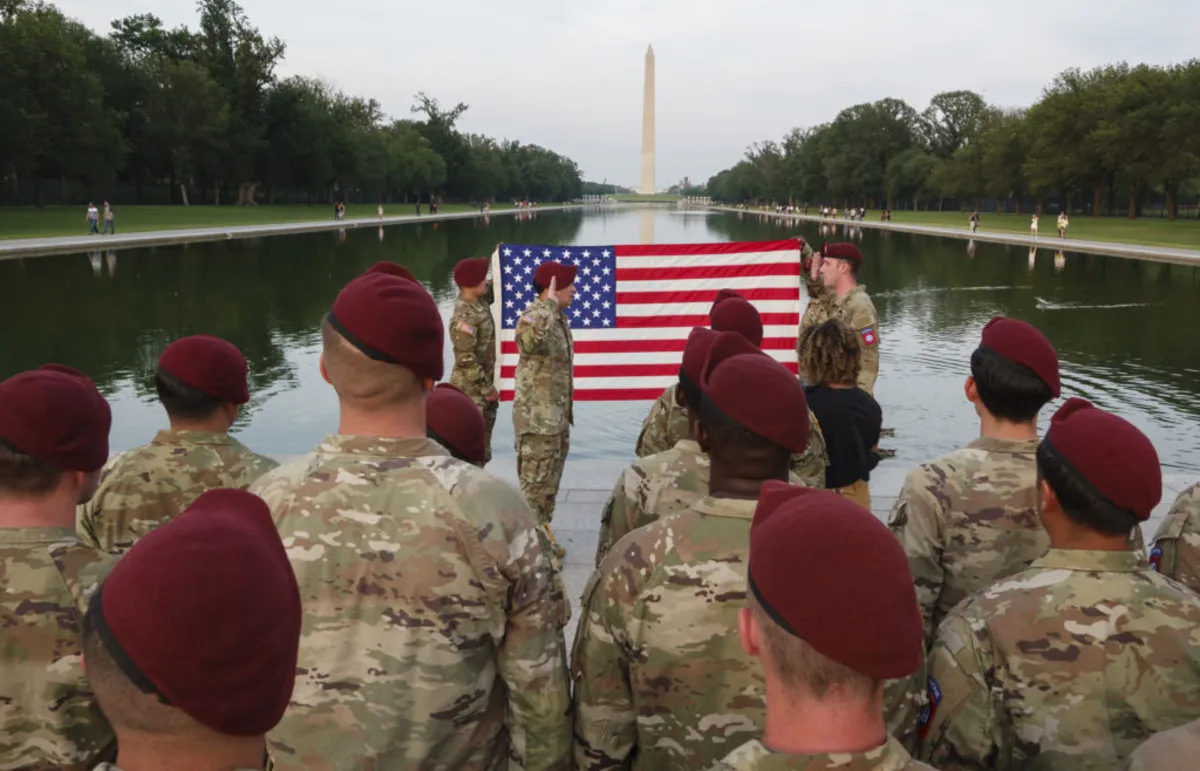
On Saturday, the United States will witness a grand military parade, marking the U.S. Army’s 250th birthday. This much-anticipated event has been years in the making and is set to take place on the iconic National Mall in Washington, D.C. Thousands of soldiers, along with dozens of massive military vehicles and aircraft, will participate in the celebration, which is estimated to cost between $25 million and $45 million.
Former President Donald Trump has long expressed a desire for a military parade, reportedly inspired by witnessing France’s Bastille Day parade eight years ago. He remarked that the United States would need to "try and top it." In a recent post on his Truth Social account, Trump emphasized the importance of honoring the sacrifices made by soldiers throughout the nation’s history, stating, “For two and a half centuries, our brave soldiers have fought, bled, and died to keep us FREE, and now we will honor them with a wonderful Parade.”
Army spokesperson Heather Hagan described the parade as a “once-in-a-lifetime” opportunity for the public to engage with the military. “This is America’s Army,” she said, highlighting that the event is free for all to attend. Military parades of this scale are rare in the U.S., with the last major parade occurring in 1991 to celebrate the victory in the first Gulf War.
Despite the celebratory nature of the event, it has faced criticism, particularly from Democrats who argue that the parade serves more as a celebration of Trump himself, coinciding with his 79th birthday. A poll conducted by The Associated Press-NORC Center for Public Affairs Research indicated that approximately 60% of U.S. adults, including 80% of Democrats and 72% of independents, believe the military parade is not a prudent use of government funds.
Critics, including history professor Richard Kohn, claim that using the military for personal gain reflects poorly on the President and diminishes the significance of the Army's 250-year legacy. Conversely, political science expert Peter Feaver acknowledged the deeper meaning behind the parade, arguing it provides a vital reminder of the sacrifices made by service members in protecting American freedoms.
The parade is scheduled to commence at 6:30 p.m. Eastern on Saturday, starting at 23rd Street NW, near the Lincoln Memorial, and proceeding approximately one mile along Constitution Avenue to 15th Street NW, near the Ellipse by the White House. The anticipated duration of the parade is around one hour. However, weather forecasts predict rain and possible thunderstorms, which the Army is closely monitoring.
Among the expected VIPs are Trump and Army Secretary Daniel Driscoll. Although the Army has not released an official guest list, a video shared by the White House hints at the presence of other notable figures, including Vice President JD Vance and Defense Secretary Pete Hegseth.
June 14 holds historical significance as the official establishment date of the Army in 1775. This date marks the adoption of a resolution by the Second Continental Congress to raise companies of expert riflemen. It is also recognized as Flag Day, commemorating the decision made in 1777 regarding the American flag's design.
Approximately 6,700 soldiers will participate in the parade, showcasing various eras and units from the Army's history. Troops will don both historic and contemporary uniforms, with displays of military equipment including Ford GPW Jeeps, M4A1 Sherman tanks, and historic aircraft like the B-25 Mitchell bomber and P-51 Mustang. The parade will also feature the Army’s parachute team, the Golden Knights, performing a jump onto the Ellipse.
Preparations for the parade have been extensive, with 150 vehicles and 50 aircraft slated to participate. Equipment such as the M1A2 Abrams tank and UH-60 Black Hawk helicopter will be on display. The total cost of the day’s festivities is anticipated to range from $25 million to $45 million. Army officials believe that the parade could enhance recruitment efforts by showcasing the Army’s legacy and mission to the public.
Due to its significance, the parade has been designated a National Security Special Event, ensuring it receives top-tier security comparable to significant national events. Federal officials expect a massive turnout, with preparations in place for potential protests. While there have been no specific threats identified, law enforcement remains vigilant.
The last comparable military parade was held on June 8, 1991, when around 200,000 people gathered to celebrate the Gulf War victory, marking a significant moment in American military history. Observers like Kohn argue that such events should be conducted with care and respect, highlighting the importance of maintaining a balance between celebration and propriety.
As the nation gears up for this monumental celebration, the military parade promises to be a significant event in honoring the legacy of the U.S. Army while sparking discussions about its implications and costs.